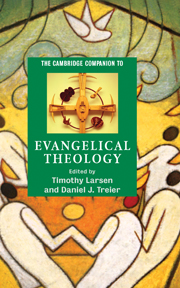Book contents
- Frontmatter
- 1 Defining and locating evangelicalism
- Part I: Evangelicals and Christian doctrine
- Part II: The contexts of evangelical theology
- 10 Evangelical theology and culture
- 11 Evangelical theology and gender
- 12 Race and the experience of death: theologically reappraising American evangelicalism
- 13 Evangelical theology and the religions
- 14 Evangelical theology in African contexts
- 15 Evangelical theology in Asian contexts
- 16 British (and European) evangelical theologies
- 17 Evangelical theology in Latin American contexts
- 18 Evangelical theology in North American contexts
- Index
17 - Evangelical theology in Latin American contexts
from Part II: - The contexts of evangelical theology
Published online by Cambridge University Press: 28 September 2007
- Frontmatter
- 1 Defining and locating evangelicalism
- Part I: Evangelicals and Christian doctrine
- Part II: The contexts of evangelical theology
- 10 Evangelical theology and culture
- 11 Evangelical theology and gender
- 12 Race and the experience of death: theologically reappraising American evangelicalism
- 13 Evangelical theology and the religions
- 14 Evangelical theology in African contexts
- 15 Evangelical theology in Asian contexts
- 16 British (and European) evangelical theologies
- 17 Evangelical theology in Latin American contexts
- 18 Evangelical theology in North American contexts
- Index
Summary
It is a well-known historical fact that the modern Latin American nations came into existence under the aegis of the Roman Catholic Church. Only a year after the “discovery of America” by Christopher Columbus on 12 October 1492, the cross and the sword were officially joined together to carry out the spiritual and military conquest of the New World for the Roman Pontiff and the Spanish king and queen. More than the Christian faith as such, what the Spanish and later the Portuguese conquistadores brought to these lands was the Roman Catholic Church - a hierarchical religious structure closely associated with the state. As John A. Crow has put it,
While other countries were content to establish themselves under Protestant or mixed Catholic and Protestant regimes which would grow toward religious liberalism, the Iberian countries created the Church-State type of authoritarian absolutism in which government and religious doctrine became inseparable. Other countries made of religion a national expression, but Spain and Portugal maintained unbroken belief in the holy internationalism of the Catholic Church.
There is no exaggeration in saying that this “Church-State type of authoritarian absolutism” became the most decisive factor in the history of Latin America for almost five hundred years, not only politically and religiously, but also socially, culturally, and economically.
- Type
- Chapter
- Information
- The Cambridge Companion to Evangelical Theology , pp. 259 - 274Publisher: Cambridge University PressPrint publication year: 2007
- 1
- Cited by



